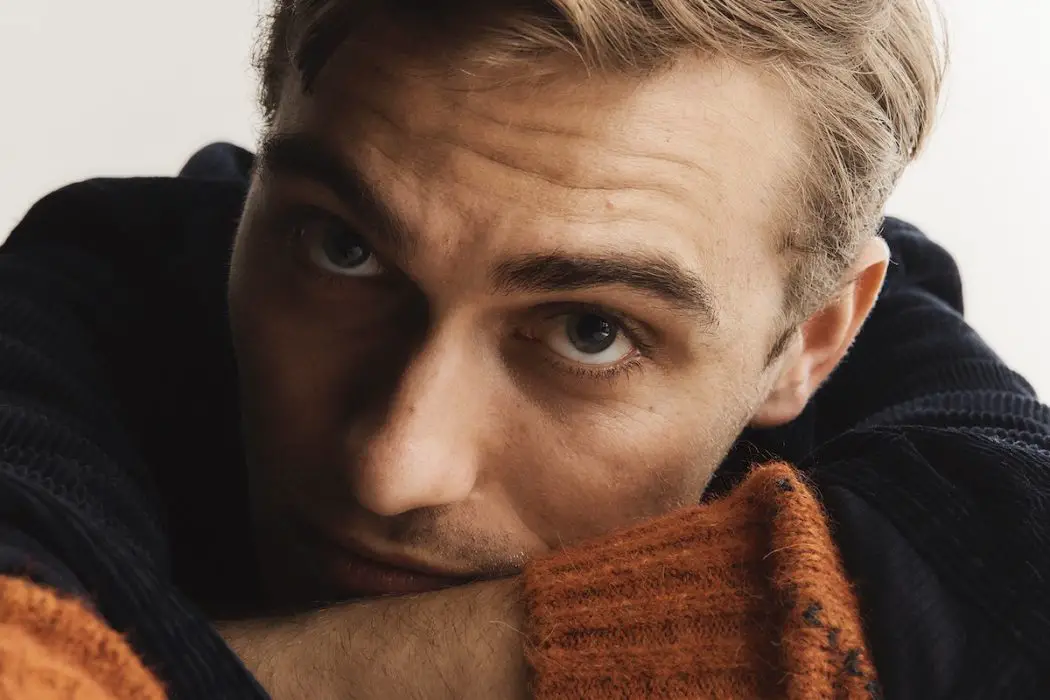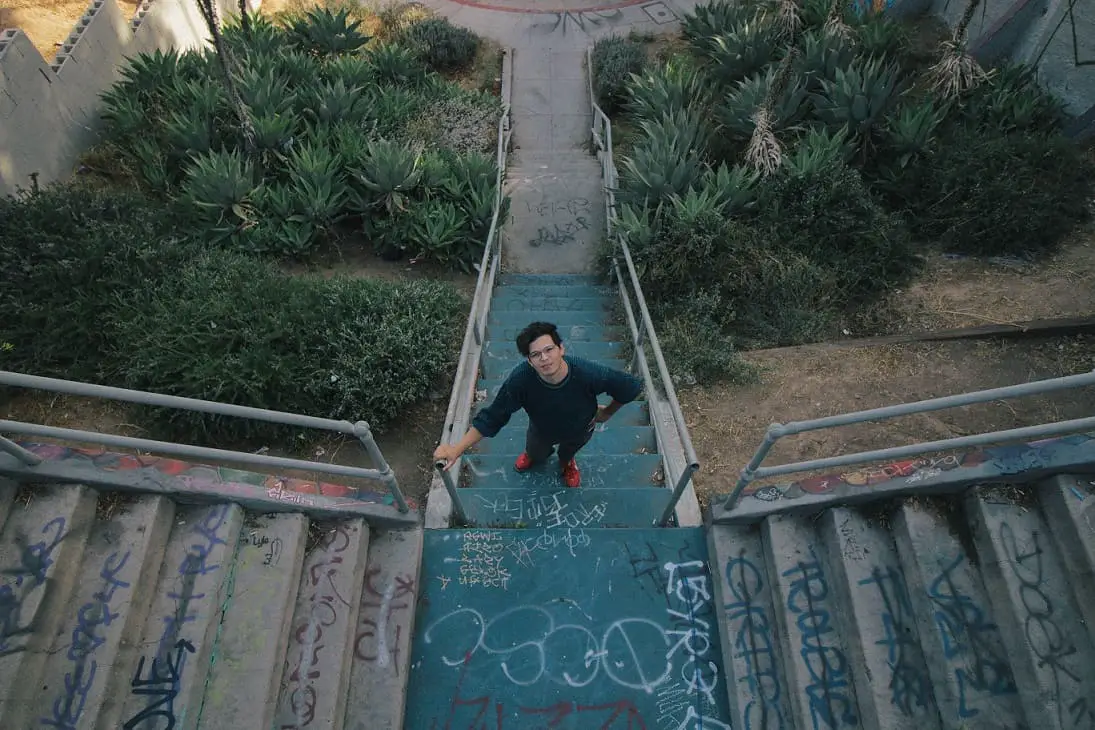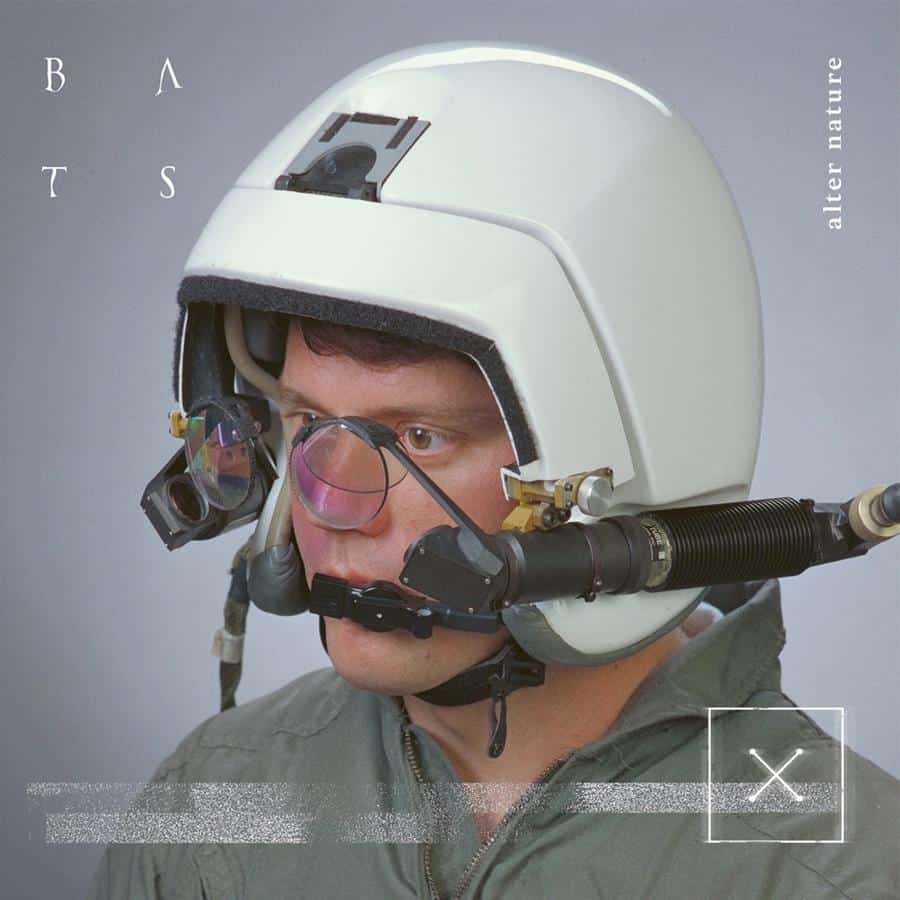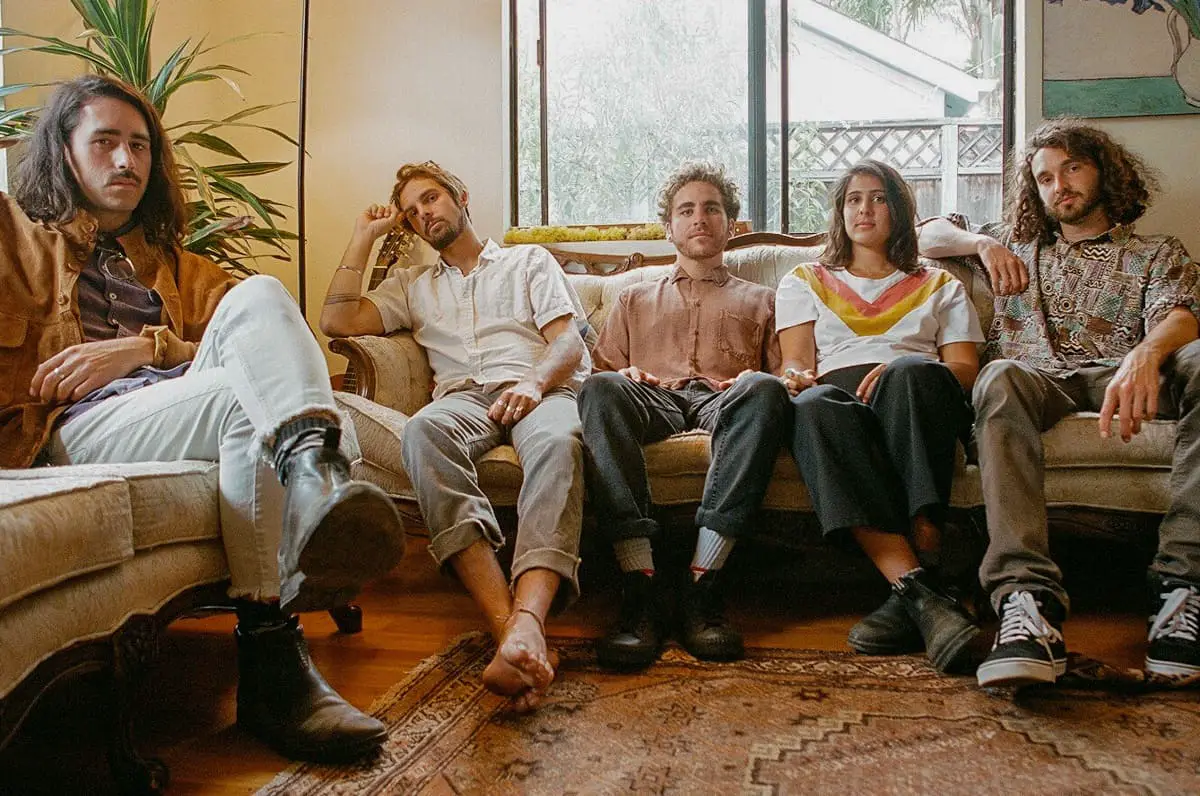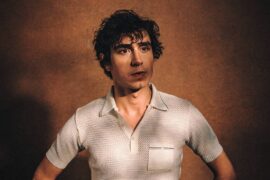Atwood Magazine speaks with Rhys Lewis about how to deal with artistic compromise, crafting production to amplify emotional resonance, breaking songwriter tropes, and his debut album ‘Things I Chose To Remember’.
Listen: “No Right to Love You” – Rhys Lewis
Even by his own admission, Rhys Lewis’ debut album has been a long time coming.
Ever since his first single release back in 2016, Lewis has stunned with his incredible songwriting ability and sensational soulful voice. Over the past few years, the sheer quantity of male British singer/songwriters with a sizable following has been astonishing. Often their success is propelled by one hit song which will repeatably be drummed into the nation’s collective consciousness through unrelenting radio play, targeted Facebook ads and, surprisingly frequently, on car advertisements. Rhys Lewis’ journey through building his devoted following has been welcomingly different.
Although the acoustic version of his stunningly emotive track “No Right To Love You” has racked up tens of millions of streams on Spotify alone, Lewis’ passionate fans have also devoured his impressive discography. The absence of a formulaic approach has been rejuvenating refreshing, with Lewis and his label allowing the music to do the talking. The fact that “Things You Can’t Change”, a non-single track lifted from his sophomore EP, is one of his most popular tracks serves as Lewis’ organic approach to releasing music.
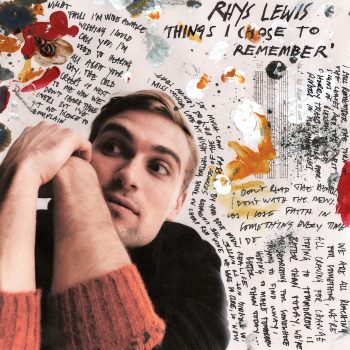
His debut album Things I Chose To Remember, released July 10 via Decca Records, represents a culmination of years of hard work, showcasing fan favourites and previously unreleased tracks this eclectic album is alive with Lewis’ incredible talent. Here at Atwood Magazine, we’ve previously hailed Lewis for his “willingness to take ownership of his own emotions in a refreshingly empowering fashion” and his ability to reflectively ruminate in an earnestly emotional way. Thankfully all of that praise unquestionably applies to debut but he also showcases a previously unexposed side to himself. Tracks such as the infectiously catchy “Under The Sun” and “Good People” see him reframe poignant emotions to appreciate flipside of uncomfortable or agonizing emotions.
Longterm fans of Rhys Lewis won’t be disappointed, as beloved tracks like “Be Your Man” and “What If?” have made it onto the album. Accompanying those tracks is a revitalised version of “No Right To Love You”, which still packs the same harrowing emotional punch as the original. Closing out the album is the affecting “Hold On To Happiness” and “What The Wild Things Were,” the latter of which sees Lewis delve into the terrifying future implications of climate change.
Atwood Magazine spoke with Rhys Lewis about how to deal with artistic compromise, crafting production to amplify emotional resonance, breaking songwriter tropes, and his debut album Things I Chose To Remember!
— —
‘Things I Chose To Remember’ – Rhys Lewis
A CONVERSATION WITH RHYS LEWIS

Atwood Magazine: Given the current situation, how does it feel to be releasing an album? I feel like it’s been a long time coming!
Rhys Lewis: It has! It feels weird to say it feels like a relief because there’s so many like strange feelings around like releasing a debut album. I do think there is a bit of relief, because it’s been such a long time working on music and finding a sound as an artist or, for me, just getting used to being an artist. Personally, it’s taken a long long time. After releasing music for 4 or so years to suddenly have a body of work come out feels like a bit of relief.
You put so much energy and effort into a body of work like this, because there is a pressure to a debut, even if that’s so personal pressure on yourself or whether that’s industry pressure or pressure of your peers or whatever it is. It’s just one of those things where it’s just nice to have the album out. You put all this time and effort into it so that when it’s finally done, you get to kind of enjoy it in a different way.
The process is amazing. I love the recording of music but when it comes to releasing it before you release it, I can’t listen to the songs. That’s just because I just want to change stuff about it. So, I hear things and I go, “I could have done it better or I could have done that differently” or whatever. So, I just don’t listen to music. Then when it’s out, there’s no way I can change it. It’s physically impossible because it’s done now. So, it’s a relief in that sense, because you go well I could accept what it is now, it’s no longer a thing I could change. It’s now something that’s unchangeable and finished. For everyone who hears it, they’re not going to listen to the things I hear in it that are the mistakes or the parts of the song I wish I changed or whatever they just hear as you know, they accept it as what it is.
Then like suddenly I do as well so it’s quite a nice feeling. Then also there’s an immense pride that comes to comes with having put together an album and also worked for three years on it. It’s a long time to commit yourself to something so there’s that feeling of accomplishment and there is a pride that comes with it because you do learn a lot about yourself and your musicality through it.
I think that’s the beauty of the creative process that I get to enjoy as a musician. I feel like I learned a lot about myself through it and that’s a really nice upshot of something like this.
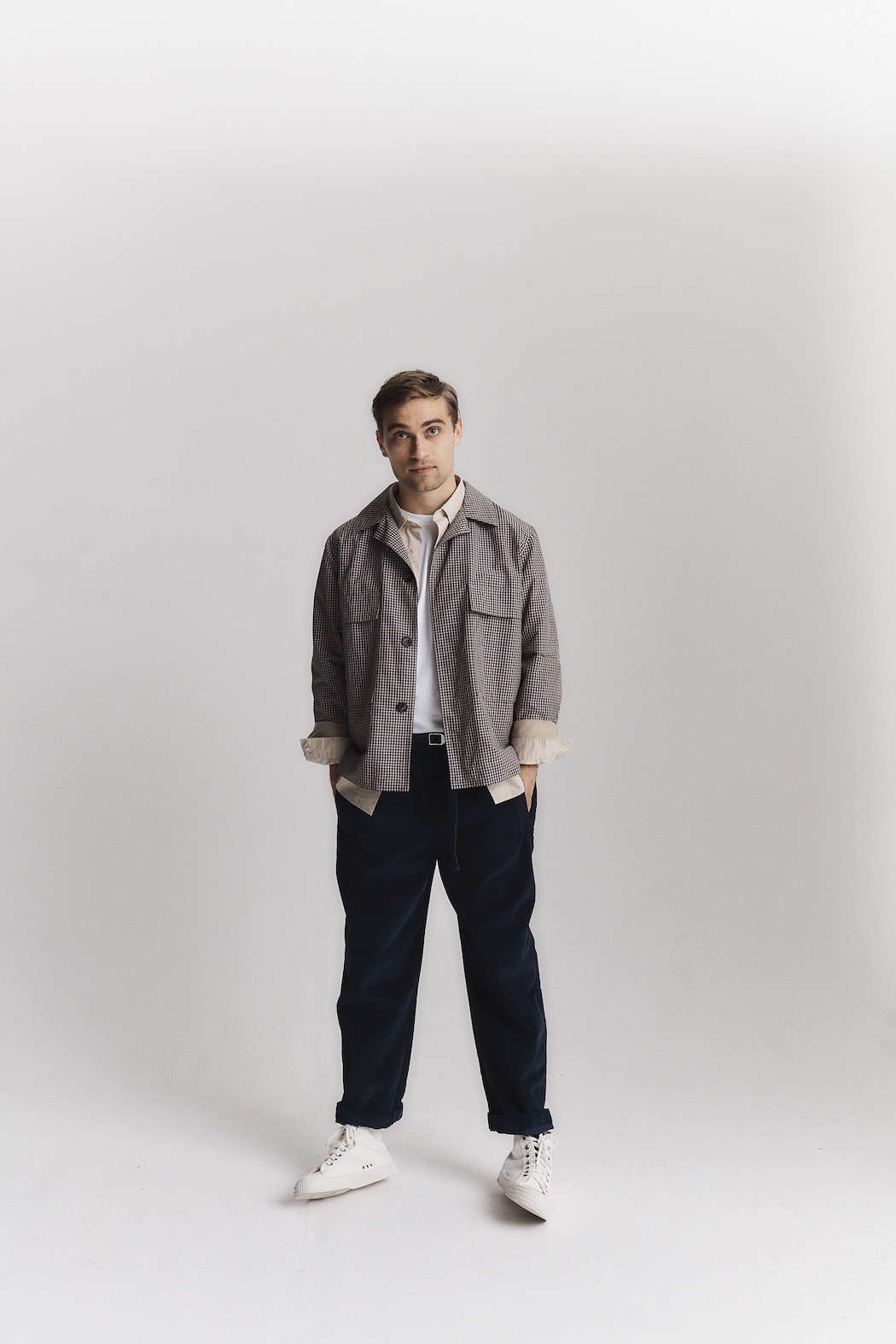
You mentioned the pressure that comes with a debut. Has that got easier to deal with overtime since you've had a good reception to stuff you’ve previously released? Or had it remained pretty constant?
Rhys Lewis: Well, you know what, I think that pressure thing comes with like putting pressure on yourself to be the best version for yourself for each song. It’s hard to articulate; I suppose there are a few different pressures. I suppose there’s personal pressure from yourself to do the best you can. Then there’s the pressure that I sometimes feel from being with a label and having them having certain expectations. What their idea of success is obviously selling lots of records and I supposed that’s part of what success is to me as well because it’s an indication that your music is connecting or whatever it is. To me, success in some respects is how authentic and how true to the feeling I can be with my music and honest I can be with the way I create it.
There have been times during the album where, you know, my label goes, “oh, this could be a really big song” or you should think about making this more radio-friendly. They’re doing their job and they’re seeing potential in something but to me, my instincts, and my sort of integrity as an artist wouldn’t necessarily take it to a certain place that they’re asking me to take it to.
You have to take on the opinions of the people you work with and your manager and your producer and your a&r guy so that the pressures of other voices can sometimes be really helpful. But other times you wonder if you’re allowing too much of your vision as an artist to change.
I think that’s the pressure I felt quite difficult dealing with on this first record because honestly there are some songs on the record that I listen to and go, “you know what, if I’d have not had those voices in my head, I’d have produced this totally differently.” But it was a lesson learned in that respect. I think as a new artist having never been through this process before I think learning how to deal with those pressures and those voices is all part of it.
I think some artists are able to go like “I’m doing this thing and I’m doing that thing; this is what I’m about.” But I’ve definitely been one of those people that are kind of happy to include different opinions and try them out and maybe changed too much from what I wanted. I think I hear those things on the record and I hope other people don’t. But to me, there are some songs on the record again, I listen to now and honestly, I go,” should I have produced it differently? Or should I have done it should have stuck to my guns?” That’s a lesson learned. It’s not that I don’t like the songs or that I don’t enjoy the record, but I do hear the compromise in front of the songs because that is truthfully what it is.
You get to a point with working with other musicians or a label and it becomes a sort of compromise because they go we want it to feel like this and are you happy to try it? And you go yeah I guess I am because you’re helping me create this record and I don’t want to be a dick and just go no and be the artist who’s a diva. So, I feel like there’s this weird balance of taking other opinions and sticking to your own. I hope that through the process of this record, I’ve done enough to keep this music and this album as a kind of authentic as possible.
I definitely think with the next record I made, I’ll have more confidence to go “no, this is what I want and I think I’m going to stick to my guns on that.” So it’s definitely been a learning curve, in that respect, dealing with the outside voices and sticking to your own personal, creative kind of vision on things. That’s something I’m pleased to have learnt but also something I definitely hear in the record. There are some songs I think, sit quite in the middle where they didn’t quite go full-on commercial, but there is a hint of it. I wish I’d just gone either go full commercial and go into that lane fully because that’s what the label says is a good thing to do, or just stick to your guns and just get let it go and let it be what it’s gonna be. I think certainly for me, looking forward to my next album, I think I’m going to try and let things be as much as possible.
I’m going to worry whether it’s a commercial song or whether it’s a crossover and whether it should be on the radio or whether we should put a drumbeat on it. I’m just going to allow myself and my instincts to say, “it could be massive if it had a beat on it but I don’t want to do that. So, I’m gonna stick to my guns. I don’t know if that made sense at all.
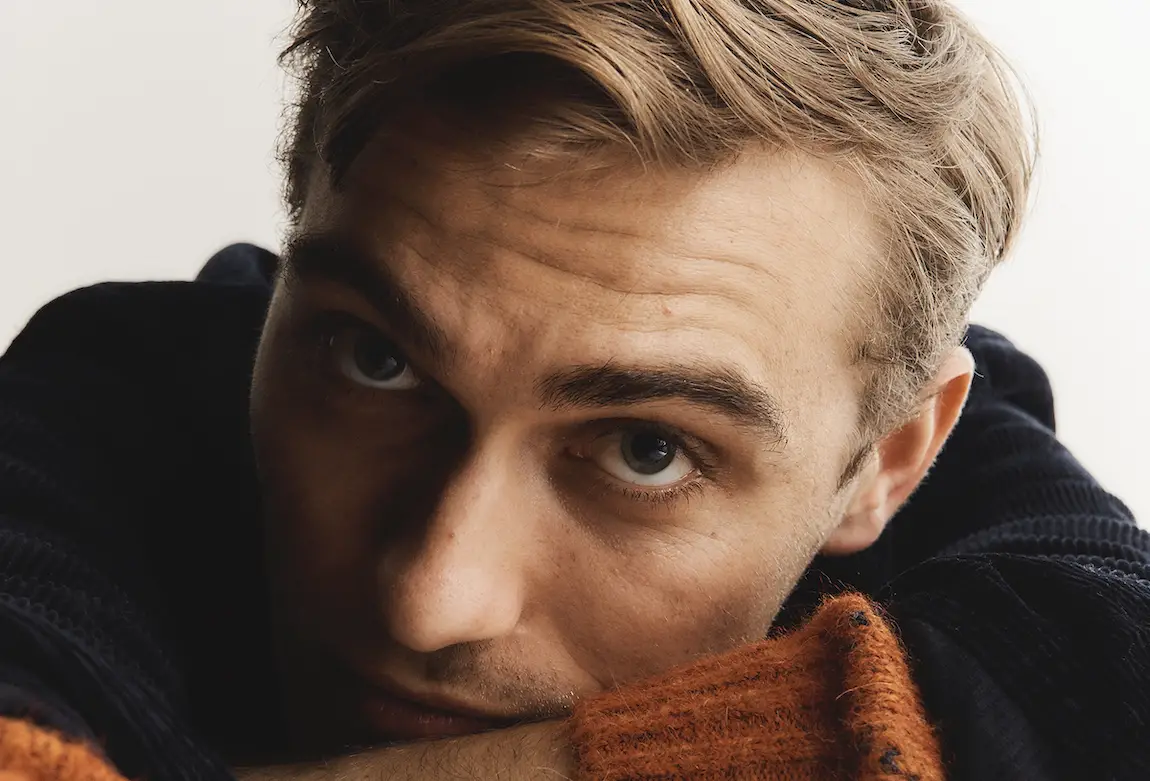
Yeah totally. I think it's even to define like what a commercial song is anymore. Like with streaming and all that stuff, the power isn’t purely in like gatekeepers hands anymore. But yeah, speaking of the album it starts with “Better Than Today” starts the album and ends with “What Wild Things Were” ends it. How did you decide to bookmark the album in that way?
Rhys Lewis: Well, it’s interesting you ask that question because basically I didn’t want the album to like start and end with love.
I’ve written a lot about breakups and I think a lot of artists do that, especially in the singer-songwriter genre. Love is obviously such an affecting emotion that it ends up being something that there’s a lot to talk about within. But I didn’t want it to feel like a whole record of love songs. I think “Better Than Today” is a song I wrote a frustration for a political situation globally. It’s a song that I think is very relevant to how I feel and it kind of reminds me of the way I’d like to hopefully look at life. It’s a hopeful song but I think it’s a realistic song and I wanted to start the album for that reason,
I think it’s more of a song about life than it is about love. For me, it sets the tone more for me as an artist, I don’t want to just be known as someone who just writes love songs, even though my songs that are most popular are the ones about love. For me as an artist, I think it’s important to talk about lots of different things and try and put those ideas into music as well.
Then “What The Wild Things Were” is a song that came to me after reading a book called The Uninhabitable Earth by a guy called David Wallace-Wells. There were lots of facts and figures about like in 2050 this will be the case and the world will be like this. It’s all about climate change, and the air we breathe will be this dangerous and there’ll be this many climate change refugees and all of these things. I think like whoever old I’ll be in 2050, I might have a kid by that point. One of the biggest threats to our society is climate change and it’s something that is really difficult to talk about without being preachy.
It’s also really difficult to kind of say something in music that doesn’t feel like you’re being self-righteous because I, for one, don’t do enough when it comes to climate change. I think we all could say the same thing about ourselves; we don’t do enough in these situations to help. I don’t want to sound like I’m being preachy, but I think it’s definitely something that if we can open up a conversation or remind someone of something in that space, I think it’s a nice thing to end the album on.
It’s such a huge global issue. With everything going on at the minute, it suddenly makes releasing an album feel pointless, like what’s this silly thing we do? We just put music out when there are so many global issues, and if we spent the same amount of time tackling those as we did making albums life would be amazing.
It kind of dwarfs any personal endeavours when these massive issues come to play and even though the idea of kind of putting on our truth can sometimes feel a bit silly in comparison to all the things that should be being talked about and promoted and so I think having a song on the album that speaks of my anxiety towards that in mind hopefully my consideration of it and passion about it, then maybe other people can enjoy knowing that there’s something of that on the album of that kind of nature.
Yeah definitely. So my next question actually like ties into what you said earlier about not just writing about heartbreak. I remember hearing “Better Than Today” when it first came out and almost like shocked back because I thought like maybe like the label would try to make you put out more like heartbreak songs. I also realised from the start of your career with songs like “Living In City” and some others, obviously, there are undertones of love but you’re simultaneously talking about so much more. With a lot of male singer-songwriter albums, they literally only sing about love for 40 minutes. How was that process of knowing that’s something you wanted to shy away from?
Rhys Lewis: Truthfully it wasn’t necessarily a conscious thing. I find that I can only really write personal experience, even if you end up having to edit it or change it or tweak it to fit into a song. For me, it always has to be rooted in something I’ve felt or understand enough or care enough about to want to sing about it or write about it. The majority of love songs that I’ve written have come from personal experiences. Obviously that sounds a bit ridiculous because I’ve written loads and haven’t been through 10 breakups, but they come from something real. Even if it’s from the same relationship you can, things can affect your relationships quite heavily so there are lots of things to talk about. There are lots of emotions that come with it but then I wasn’t in a relationship for a long time so the things I ended up writing about weren’t about love because I wasn’t in love and I wasn’t experiencing those emotions.
So it was natural to me that I would start writing about things I did care about, and that were affecting me. “Living In The Song” is about loneliness, and being in a place that you kind of love and hate and trying to make your way in a city that’s quite exhausting and overwhelming. That was a huge part of my life and something that really bothered me much more than love did it at the time. The same thing applies for these other kinds of situations and subjects that I want to write about. They affect me, so I have to, I really want to kind of understand them more or communicate because I know that if it’s affecting me a lot, we’re also similar.so it’s definitely affecting someone else too. A really nice thing about writing songs that aren’t just about love is that I feel much more connected to the people I share my music with when it’s a song about life, and they go, I totally get that.
Obviously, love is such a uniting feeling, and especially heartbreak is such a kind of familiar feeling to a lot of people all around the world. We’ve all felt it, but there’s something really powerful to me about explaining how I feel about something in life that’s a little bit more nuanced and personal to me. But then suddenly, you open up this conversation to other things and anxiety and loneliness and I think that’s a really nice thing as a songwriter to try and articulate and then feel this connection with people around the world are feeling the same thing. I feel very lucky that I have people that want to listen to music now so that when I do release a song people do hear it and that’s amazing. In a way, it’d feel stupid just to release love songs because I get to release lots of things I’m thinking about and share that with the world which is really nice.
Speaking of connecting with people, the acoustic version of your track “No Right To Love You” has struck a chord with so many different people. I know that that song has gone through so many different version, so how did you finally settle on the version that’s on this album?
Rhys Lewis: Well, to tell you the truth, I still can’t say if I’m happy with it. The version I’m happiest with and the version I think it’ll always be is the original version I put out. That version is just me and a guitar and I think that’s how that song should live.
I put that song out maybe two years ago now and because it was my most popular song and people are connected in that way it felt like the right thing to do a new version for the album of that song. I approach it differently and I’m really pleased with how it feels. It feels like it’s very much vocal guitar-led song but it just has a few extra production touches to kind of give it something new. I have no idea because I think I lost the love of producing that song after having produced so many versions of it. So, I did sort of five or six versions of it quite a while ago and then ended up just giving up. And I said to my manager, “I’m not doing another version of that song ever again.”
Then we got the recording the album and I started working with Aiden, who’s my keyboard player and a good friend now who’s become my sole key collaborator on the album. He said, “it’s a lovely song” and if you need to do another version of it, I’ve got this idea of like a String Quartet thing and making it something kind of still very beautiful and intimate, but just a bit more produced. He explained to me what he thought and I totally agreed. As soon as you put other things on a song like that, which is very intimate and personal, it can sometimes just take you away from what the song is about. So, I was very conscious of that being the case.
But we tried it and we did it all the tape as well, which is an inspiring thing to do. It forces you to work in a certain way so we did full takes of this song and Got a string quartet in to give it intimacy and texture, that I think really hopefully suits the song and kind of draws you in. As a produced version goes, it’s my favourite version I’ve done but I’m on too far gone, having done too many versions, to know if it’s any good.
Although I love singing this on this arrangement of the song and I think it’s a testament to a good production when you as a vocalist and artist enjoy singing within that arrangement. It was actually an arrangement that we put together for a Vevo session that we kind of took and just made it into the produced thing. I think it feels really nice so hopefully, it’s a nice other version of it, but I’m still really attached to the original but I don’t think my label will be happy with me telling you that.
They’ll be like “you need to tell everyone this is the best version, and everyone go stream it.” Which obviously they hopefully they do. I’m just so attached to that song now and I’ve done so many versions that it’s really hard for me to know what’s good anymore. So hopefully we’ve done song justice it with a new version, but only time will tell. What did you think of it?
I’ve sneakily heard a few versions over it the years and it’s definitely my favourite too.
Rhys Lewis: Ahh brilliant, just out of interest, does it still feel like emotional and intimate?
Yeah definitely but I agree with you in terms of the acoustic version being my favourite. This version feels very true to the original and I guess I listen to this new version through the emotional lens of having heard the original if that makes any sense. Like I listen to the new version and connect with the lyricism in the same way, because I’ve already so connected with the lyrics. In the same breath, I feel like if I hadn’t heard the original before, I would still feel the same way about the song.
Rhys Lewis: Yeah, I also think if you hear the song before and hear the produced version normally what happens is that you’re going to hone in on the lyrics and melody anyway. But I suppose because if you’ve heard a version of it before you’re going to naturally focus on production to notice the changes and difference. Whereas if you’ve never heard the song, I’m hoping that people go, “oh, this is a new song” and they just hear the song first and then they wouldn’t question whether it’s produced or not, because they haven’t they’re the unproduced version.
I think it's interesting like how different people listen to different things first, like I always listen to lyricism first. I always thought like most other people did the same. Then I was speaking like speaking to other artists who like exclusively listen to production first. I think that's quite a strange a concept that kind of relate to I guess, I think for me, the lyricism is so important.
Rhys Lewis: Interestingly I think I listen to different things in relation to the genre of music. I think in singer-songwriter world, if there’s not good lyrics, then it’s just nicely recorded. acoustic guitar. When it comes to like other genres or bands, I’m probably listening more to the production because I go there’s probably more complexity and variation. I don’t know if it makes any sense.
I guess if you’re listening to like the characteristics of the guitarist and the drummer and the bass player you want to you kind of get this sense of a band, and then sometimes the lyrics aren’t as integral to the immediate kind of energy of the song. Whereas I think with the singer-songwriter genre, I think that maybe the lyrics seem to be the heart of whatever it is you’re doing. Whereas if you’re listening to an electronic artist, obviously they can have amazing lyricism too, but you think they’re probably their passion lies in the production. By the way, that is not to say that like production is off-limits to singer-songwriters. For me, there’s like sort of cornerstones of each genre that I think indicate whether something is good.
Yeah definitely. I think it’s so interesting how production can like transform a song too. There’s an artist called Luz, who I think actually supported you before, who did a cover of “Don't Start Now” by Dua Lipa. Obviously, that’s such a huge anthem and an insanely popular song but given the context, you listen to it in and the production, the realities within the lyricism might not as like hit as hard all the time. Luz’s version just strips it down to her voice and the piano, which made me realise that the song is actually like one of the saddest and most melancholic songs I’ve ever heard.
Rhys Lewis: Yeah, that’s true actually. I guess that completely just recontextualises it.
Yeah but anyway, back to the album, I love the track “Under The Sun”. I’ve love to hear about what inspired you to write the track and how you crafted the production.
Rhys Lewis: I think that’s a really fun one to get into production on because we talked about the song and the demo was just an electric guitar, vocals and some like clicks; it was very sparse. In much the same way I think the production is; there’s not like loads going on. Everything is quite simple, but it’s all kind of hopefully got some personality to it. I played Aiden the song and he really liked it and he said, “why don’t we try to two bass guitars?”. So, we’ve got a double bass and an electric bass playing the kind of what the guitar part was and what the guitar part is, but it starts on these two double basses. It kind of just went from there and we thought we could actually be quite quirky with it and make it into something slightly more unique than just the guitar part.
It was a really, really fun one to produce and then we had this idea of a syncopated synth thing in the chorus that kind of played off the main rhythm of the guitar parts. It just all fell into place quite nicely. It was really fun to record that one on tape, and we kind of got this really strange bass part, together with two different bass guitars. I think the idea was to try and make it still feel quite quirky and not too sad.
There’s a playfulness to it. But if you choose to like to dress it up in a different way, it could be a really sad song, but the sense of this song is just like you really miss this person. It’s not like you’re not home crying, it’s more just like you’re reflecting on something and thinking about how amazing it was.
On the album, “Good People” is obviously a happy song but also acknowledges the all-consuming nature and unpredictability of what you do. How do you stop yourself being overwhelmed by it?
Rhys Lewis: Well, it’s interesting. I spend so much time away from my family, and outside of the kind of circle of family and friends and I guess you get really used to missing birthdays, weddings and all that stuff. I haven’t had that kind of social life or family life as regularly as most people do for such a long time, and kind of get used to it. I think dangerously when you get used to it, you forget that it’s important and I think there’s been definitely been times in my in the last few years where I’ve kind after I’ve just forgotten that it’s something I really need to kind of actually put effort into to, to keep as a part of my life.
If you’re always away, you just get so used to that that you just stop. Also, people stop sometimes thinking about you, you just kind of just lose touch with that side of your life. What’s been amazing is my family and friends have always been very accepting and understanding of that and what I do. So, there’s been times where I felt very guilty for not being around and maybe being a little bit kind of unaware of how much my absence has affected them.
Obviously, when you’re on tour, it’s really fun and you get to travel the world, you’re kind of in a little bubble. But they have always been very supportive of me and I think I’m someone who’s very good with my own time in my own company. Whenever I come home, it’s a reminder of how much I miss them. It’s also a reminder for me that I should be appreciative of how supportive they’ve been throughout the course of my career. It’s another thing that because they’re not musicians, it’s sometimes really hard to explain the whole world and the whole industry to them. So you, you just give like short answers to questions that they might have because you know, the answers can take too long. You just end up not being able to share everything you do with them because that’s just the way it is. But by doing that, you sometimes you just sort of end up with this grey area of your life that you can’t really explain. Like it would take and there’s too much context to explain the whole career and so you just go “yeah, it’s going well.” You just give me short answers like you do when you see your uncle at Christmas, you give like short meaningless answers.
I’ve tried in the last few years to try to open up what I do more to my family and hopefully, they understand where I’m at and where my headspace is at. I think sometimes my behaviour of the person can come across as being like I don’t care when actually it’s more that I’m just a little bit wrapped up in other stuff. So this song for me is acknowledging that they’re always there for me whenever I’m going through something even if I’ve been away for months, and they’re always happy to kind of help me out if I’m struggling with whatever’s going on in my life. So it also just reminds me to also give a bit back to when I can be there for them. Just basically to be more present in their lives as much as they are in mine when I need them to be.
How did you settle on the title for the album?
Rhys Lewis: It’s funny. I’ve always been terrible at naming things, like really terrible. I’ve just not been good at it and I’ve found it stressful. I think the same thing happened with the album. I didn’t have a name for the album whilst I was recording it. I know some artists kind of come up with a name for the album before they’ve even written a song, they go, I’ve got this idea on all these songs to be kind of about this or like, I want this body of work to be summed up by this kind of phrase, or whatever it is.I think that’s an amazing thing to have but I just didn’t have that by the time I started recording and I’d been writing two or three years. So, I kind of, I had to put a name to a body of work that already kind of become something. It took me a while to sit down and work out what all of these songs had in common because I think I wanted the title to sum up, what this body of work is, or this collection of songs is to me, or where it came from.
I realised that the majority, like pretty much all the songs on the album, are very nostalgic and reflective. The funny thing about songwriting is that I end up writing about are these moments in my life that have affected me in a certain way or kind of been stuck in my head or these emotions that I feel I need to speak about or understand more. They’re these things that I choose to kind of put time and energy into. They end up being little sort of journalistic diary entries, because, you go that was where I was at with that thing. Then I processed it and kind of understood it, and then it’s become a little song. They feel like they’re like timestamped. Sometimes I listen back to some songs and I think it’s mental that I felt that way. Like I was clearly very, very emotional.
It’s like with a breakup where you go, oh my god, did I really send that text. You can sometimes go through your songwriting process and go shit, did I really feel like that? It’s interesting how looking back on your emotions, once they’ve been kind of archived as songs, can define you in a way. Or you can choose to say that’s just stuff that’s happened to me. It’s hard to explain.
I guess what it is is that all of these songs are very, very, very reminiscent of something and there’s regret to them. I used to think that reflection on the past wasn’t a very original kind of through-line for any kind of body of work. But then when you listen to other people’s music, and you realise that not all of their songs are about the past or reflection, self-reflection, you realise that actually that’s a certain perspective I’ve chosen or developed within my songwriting process.
So that self-reflection thing or reflecting on the past is a massive part of what I seem to do as a songwriter. So it kind of made sense to reflect for to use that as the concept for the album title. Things I Chose to Remember is just like these moments in my life that I’ve cared enough about to want to kind of go into to make into something enduring lasting.
It’s a bit of strange question given what’s going on in the world right now, but what are you most excited about in the future and hold to stay true? I guess it’s strange having delayed the album to be put into the same situation that you were in before.
Rhys Lewis: I know I should keep it as on brand about the first album as possible but I’m really excited about recording another album. I’ve loved recording this one and I’ve learnt so much about the music, the process, myself and creativity. I think to have that same experience again and to learn more about songwriting and production through making another album is really exciting.
There’s so much going on in the world to make you feel anxious, unsure and unsettled so having something like music in my life to focus on when the world is going a bit crazy makes me feel extremely lucky. In answer to the questions, I’m excited to be gigging again and really excited to put my creativity into a new album. That’s what I’ve been doing the last few months and I’ve been enjoying it so much!
— —

Connect to Rhys Lewis on
Facebook, Twitter, Instagram
Discover new music on Atwood Magazine
? © Charlie Gates
:: Stream Rhys Lewis ::

